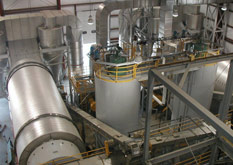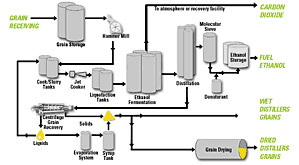ICM, the Colwich-based designer of ethanol plants, is introducing a new process that will allow ethanol plants to produce high-quality human and animal food -- in addition to biofuel -- from corn.
The new technology, developed over a decade of research at ICM plants in Colwich and St. Joseph, Mo., adds new product lines to the ethanol production process while reducing the consumption of fossil fuels, enzymes and water, said David Vander Griend, president of ICM.
The process -- called Total Kernel Optimization or TKO -- was unveiled Monday at the International Fuel Ethanol Workshop in Nashville.
"The ethanol plants of tomorrow will probably make more money from selling human food products than from selling fuel," Vander Griend said.
Installation of the technology has already begun at the St. Joseph plant, which ICM owns jointly with Lifeline Foods. Snack grits, a ground product used to make snacks for human consumption, are already manufactured at that plant.
"Sometime down the road is the stand-alone cellulosic plant that will make ethanol from waste wood scraps and biomass," Vander Griend said.
"But we can't afford to wait that long to improve the industry's productivity and profitability. We had planned to roll this out next year... but the industry needs it sooner. So we're delivering it sooner."
Vander Griend said the new technology will make ethanol profitable, even if gasoline prices fall and corn continues to sell for $6 to $7 a bushel. That's because the new process produces items -- such as corn oil and high-protein concentrate -- worth more than $4 a pound.
In addition, costs for natural gas can be reduced -- by up to 80 percent -- by burning a fuel derived from the production process.
Vander Griend said increasing the value derived from processing is more important than reducing the price of corn.
"Frankly we need corn at $5 of $6 for American farmers to be profitable and for agriculture in Third World countries to become established," he said.
The new process
The new process can be installed in an operating ethanol plant without interrupting current production, Vander Griend said. Paying for the upgrade by using revenue from increased product lines is expected to take 18 to 24 months.
The new process is "dry mill" or "dry fractionation" as opposed to the current "wet milling" process that produces human food such as corn oil, corn starch and high fructose corn syrup; ethanol, and distillers grain for animal feed.
It more fully separates the components of the corn kernel to create germ, endosperm and fiber.
From the germ, oil and protein are harvested for the human food market.
The endosperm provides starch and protein. The starch becomes ethanol and the protein is human food.
The fiber from both becomes fuel to power the plant.
Vander Griend said the retrofit of the St. Joseph plant will be completed in two to three years. ICM has a goal of retrofitting nine existing plants a year, beginning in 2009.
About 50 percent of existing ethanol production facilities use ICM's process. That includes 73 operating plants and 26 under construction.
But the building pace for new plants has slowed drastically. ICM has not started a new construction project in almost a year.
The industry slowdown has come from a combination of factors including a glut of ethanol caused by production that outpaced the ability to transport and blend it. Higher construction costs, higher corn costs and a nationwide credit crunch also are factors.
That's the advantage of the new process, which produces food in addition to fuel. The process also has other advantages.
"The world food system has been long on starch and short on protein for decades," Vander Griend said. "The plant proteins created in this process can be sold to supplement the diets of humans in developing countries or fed to livestock to produce meat in other parts of the world."
The separation of oil and fiber from the protein also will create a higher-quality distillers grain that will be suitable to use in feeding swine and poultry as well as the cattle feed it currently provides.
"The lower-cost protein supplements gained in this process retain the human- and animal-food value of lower-priced corn to producers," Vander Griend said. "At the same time, it produces the biofuel that has already dropped gasoline prices by 10 to 15 percent over where they would be without ethanol."

